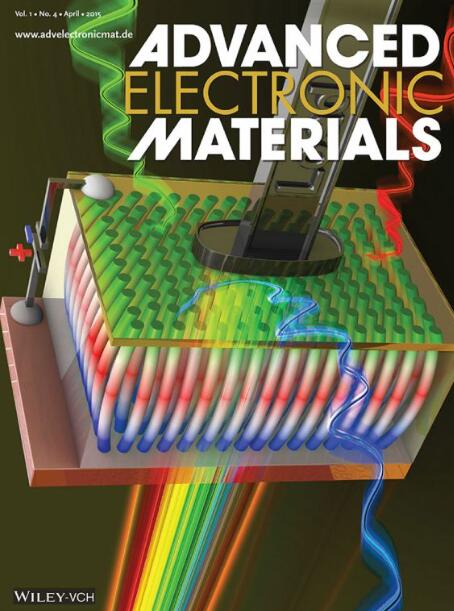Elimination of Double-Slope Nonideality in C60 Field Effect Transistors
IF 5.3
2区 材料科学
Q2 MATERIALS SCIENCE, MULTIDISCIPLINARY
引用次数: 0
Abstract
Double-slope nonideality, widely observed in organic field-effect transistors (OFETs), leads to inaccurate extraction of field-effect mobility, hindering the evaluation of new organic semiconductors and limiting OFET applications. This study presents a solution to this issue in n-type OFETs based on C60. Applying a pre-scan reversed gate-source bias (PRGSB) eliminates the double-slope nonideality. This discovery emerges serendipitously during an experiment where the source and drain connections are accidentally swapped. On the basis of the gradual formation of the active channel as the gate voltage increases, it is proposed that the double-slope nonideality stems from high-density traps in the semiconductor layer near the source electrode, presumably due to defects introduced during vacuum deposition of gold contact. The application of PRGSB injects positive charges into the dielectric layer via a large source-gate voltage. When this voltage is removed, the trapped charges act as an additional gate voltage during subsequent gate scans, filling the traps near the source and correcting the nonideality in the transfer I–V curve. These findings offer a new approach to addressing the double-slope nonideality challenge in OFET characterization and suggest an unprecedented explanation for this phenomenon.

C60场效应晶体管双斜率非理想性的消除
双斜率非理想性在有机场效应晶体管(OFET)中广泛存在,导致场效应迁移率的提取不准确,阻碍了新型有机半导体的评估并限制了OFET的应用。本研究提出了一种基于C60的n型ofet的解决方案。应用预扫描反栅极源偏置(PRGSB)消除了双斜率非理想性。这一发现是在一次实验中偶然发现的,在实验中,源极和漏极连接被意外地交换了。根据有源通道随着栅极电压的增加而逐渐形成,提出双斜率非理想性源于源电极附近半导体层中的高密度陷阱,可能是由于金触点真空沉积过程中引入的缺陷。PRGSB的应用通过较大的源栅电压向介质层注入正电荷。当这个电压被移除时,捕获的电荷在随后的栅极扫描中充当额外的栅极电压,填充源附近的陷阱并纠正转移I-V曲线中的非理想性。这些发现为解决OFET表征中的双斜率非理想性挑战提供了一种新的方法,并对这一现象提出了前所未有的解释。
本文章由计算机程序翻译,如有差异,请以英文原文为准。
求助全文
约1分钟内获得全文
求助全文
来源期刊

Advanced Electronic Materials
NANOSCIENCE & NANOTECHNOLOGYMATERIALS SCIE-MATERIALS SCIENCE, MULTIDISCIPLINARY
CiteScore
11.00
自引率
3.20%
发文量
433
期刊介绍:
Advanced Electronic Materials is an interdisciplinary forum for peer-reviewed, high-quality, high-impact research in the fields of materials science, physics, and engineering of electronic and magnetic materials. It includes research on physics and physical properties of electronic and magnetic materials, spintronics, electronics, device physics and engineering, micro- and nano-electromechanical systems, and organic electronics, in addition to fundamental research.
 求助内容:
求助内容: 应助结果提醒方式:
应助结果提醒方式:


